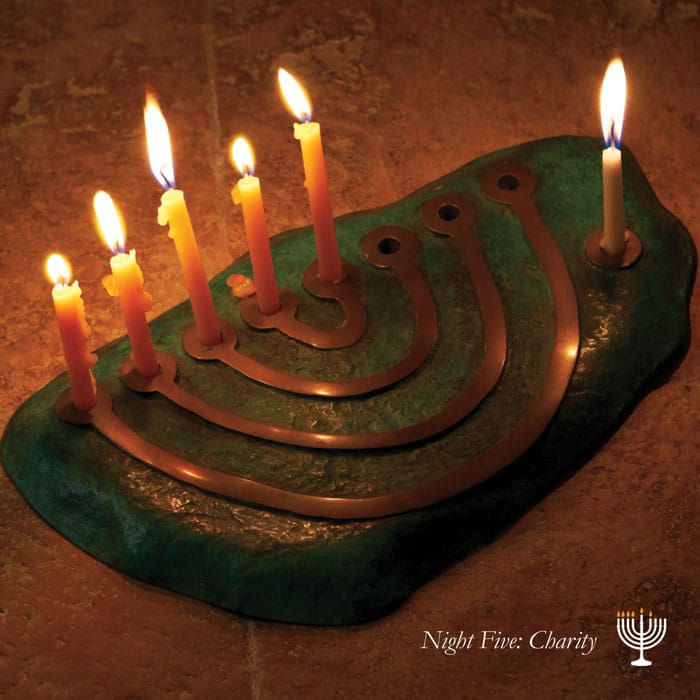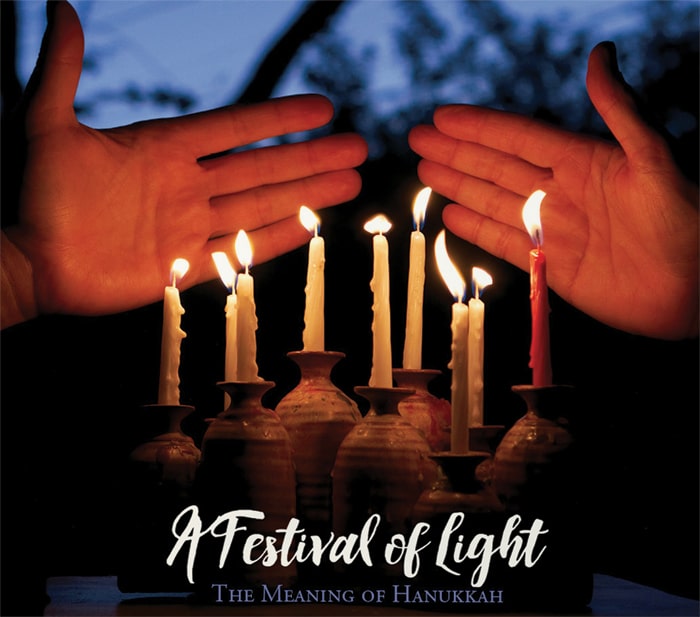 Hanukkah Night 5: Charity
Photo by Joel Lipton
Hanukkah Night 5: Charity
Photo by Joel Lipton Josh Freeman and Paul Small are on a mission to make Hanukkah more open and inclusive.
Hanukkah is a time of reflection, as well as an opportunity to bond with family, friends and community. So, why not use the time to spark conversations on universal topics with people of all faiths?
The authors — who are also cousins — hope their new coffee table book, “A Festival of Light: The Meaning of Hanukkah,” ignites these kinds of dialogues.
“I believe that we have an opportunity to change the very fabric of how Hanukkah is perceived,” Small, an LA-based realtor, told the Journal.
Freeman and Small’s great uncle, American Playwright Dore Schary, wrote a series of eight essays, one for each night of Hanukkah, to be read when they lit the candles. These essays, which explored the essential human values of Faith, Freedom, Courage, Love, Charity, Integrity, Knowledge and Peace, were their inspiration for the book.
Freeman and Small’s great uncle, American Playwright Dore Schary, wrote a series of eight essays, one for each night of Hanukkah, to be read when they lit the candles. These essays, which explored the essential human values of Faith, Freedom, Courage, Love, Charity, Integrity, Knowledge and Peace, were their inspiration for the book.
Schary, who passed away in 1980, was one of Hollywood’s most distinguished hyphenates (writer-producer-director-executive) with 372 film credits. He was head of MGM Studios from 1948 to 1957.
Freeman and Small, whose grandmothers were Schary’s older sisters, have similar backgrounds in that their fathers’ side of the family was Jewish, but their mothers were not. Lighting the candles and reading “Uncle Dore’s service” was the family tradition.
About 10 years ago, when Small was dating the woman who is now his wife, he invited her over for dinner during Hanukkah.
“I lit the candle and read that night’s essay, and she was visibly touched,” Small said. “I looked at her like, ‘You’re not Jewish. Why does this impact you at all?’ And she said, ‘It’s not a Jewish thing. It’s not a Christian thing. It’s a universal, [human] thing.’”
Nearly a decade later — after first trying to publish the book traditionally through an agent and then attempting to get the book funded through a Kickstarter campaign — Freeman and Small decided to put the book together themselves. They expanded upon the ideas from the essays, pairing them with photographs, contemporary and iconic quotations, musical playlists, historical context, delicious recipes and personal reflections.
“Our book is an attempt to invite people to have a conversation about something that includes the service, but is larger than just that,” Freeman, president and creative director of Los Angeles-based design agency FreeAssociates, told the Journal.
The quotes and the pictures were a natural way to take these “dusty” 70-year-old essays, expand them and make them relevant for current generations. The book is also sprinkled with personal Hanukkah stories, recipes and plenty of pictures of menorahs.
When they asked friends and family for Hanukkah stories, they also asked if they could borrow their menorahs.
“Menorahs are something that to me were a functional item,” Freeman said. “It holds the candles, and if it’s visually appealing, great.”
The authors discovered that some people have dozens of menorahs, which they love and light all over their home.
Freeman and Small spent several days with photographer Joel Lipton, who took pictures of the menorahs in Small’s backyard.
At one point, the wind came up, and Lipton asked them to “keep those candles from going out.’”
Freeman and Small used their hands to shield the candles from the wind; Lipton took that photo, which became the cover shot.
“I love that,” Freeman said. “It just captures the spirit of the book. We’re sort of sheltering the idea of Hanukkah, and creating this new way of looking at it.”
In the back of the hardbound “A Festival of Light” there’s a pocket which holds a booklet of Schary’s Hanukkah service, aka the essays.
“Whatever night it is, you’re going to light the candles, say the blessing and read that night’s essay,” Small said. “Then, you can sit down with your family and open the chapter in the big book.”
Families and friends who have gathered can look at the images, read the quotes and stories, and perhaps ask Siri or Alexa to play one of the songs on the playlist. Then they can each share what the word of the night means to them. Families can even cook one of the recipes together.
Schary’s parents ran a successful catering company in Newark in the late teens and early 1920s. Since Freeman and Small come from a family that loves to cook, it was important for them to incorporate food into this project. In the book there are a few of their family heirlooms: the brisket, the chicken soup and the polenta cake. The other recipes came from friends.
“The whole thing was to try to have as many avenues into the experience as we could, and make it as much fun as we could,” Freeman said. “And families that get together and talk about this stuff need to eat something, right?”
“It’s just a matter of creating this memory,” Small said. “The goal here is obviously to create this warm, collaborative family experience.”
Schary had three children — two daughters and one son — and they have been 100% supportive of this project. In fact, his daughter, Jill Schary Robinson, wrote the forward and one of the stories in the book.
“From the response of his three kids, I know Dore would just adore this,” Small said.
Freeman and Small believe this book is a great opportunity to shed a light on Hanukkah in a mainstream way. They have been doing “demo” events throughout Los Angeles, including one recently at the Skirball. They do a theme based on one of the elements from the essays, and have music, food, conversation and, in some cases, an art project.
“Let us Jews give this gift of Hanukkah, which is really a celebration of these eight values, to hopefully create more connection in the world, in a world that just terribly needs to be connected,” Small said.
Since Hanukkah is toward the end of the calendar year, during that time, humans — especially Americans — take stock of how the year went and then look forward to the next one.
“Hanukkah means dedication,” Small said. “And each year we rededicate ourselves to the story of the Maccabees and what they did in reclaiming the temple.”
Freeman and Small thought, “Could Hanukkah in a bigger sense be the time of year where we rededicate ourselves to becoming better Jews, better Americans, better humans … however, that applies to our life.”
Learn more at afestivaloflight.com
“A Festival of Light” Excerpt
Night One: Faith
 Tonight we begin the celebration of the holiday Hanukkah.
Tonight we begin the celebration of the holiday Hanukkah.
Hanukkah means dedication, and the holiday itself represents the rededication of the Temple that was dishonored by Antiochus IV in 165 BCE. and then restored by the valiant struggle of the Maccabees.
However, in a much larger sense, this occasion should be a rededication of all the things that we hold dear in our Jewish and American life.
During this holiday we light eight candles. These candles are lit on succeeding nights.
The first night, we light one; the second night, two; the third night, three; the fourth night, four; the fifth night, five; the sixth night, six; the seventh night, seven; and the eighth night, eight. This gives us an opportunity each day to rededicate each of the previous candles and to reaffirm the high qualities they represent.
The eight candles represent, in order, the following:
One: Faith.
Two: Freedom.
Three: Courage.
Four: Love.
Five: Charity.
Six: Integrity.
Seven: Knowledge.
Eight: Peace.
We use a pilot candle with which to ignite the other candles. With the first candle we kindle, we hope to illuminate in our minds and hearts the first word, “Faith.”
People who fought to rededicate the Temple were people who held in their hearts real and true faith – faith in the God of Israel and faith in the dignity of their own persons and their own souls. The victory of the Maccabees was a practical demonstration of their faith. But faith can be shown in many ways other than war.
There is the faith that we must have in God, the faith that we demonstrate by our conduct toward each other. We pray, to bolster our faith in those things we believe in. We pray to pay homage to God, and by doing so our faith becomes illuminated, just as this candle illuminates the darkness around it.
We must have faith, too, in our nation. This we must demonstrate by taking part in its activities and by living our lives as decent and respectable citizens.
There is the faith that we must have in our parents and the faith that they must have in their children; the faith of the flock in the rabbi and of the rabbi in his people; the faith that exists between student and teacher; doctor and patient; the faith between spouses; and finally, the faith of all people in each other.
We cannot blindly assume that all things will always turn out well, but we must have faith enough to overcome our disappointments, our frustrations, and believe that most people believe more in good than they do in evil.
As we look at this first candle tonight, let us reaffirm once again all these different kinds of faith. Let us thank God for His wisdom and for His guidance.
The righteous shall live by his faith. (HABAKKUK 2:4)
Grandma Schary’s Heaven-Sent Brisket
by Edgar Small
 INGREDIENTS
INGREDIENTS
5–6 pound brisket
3–4 Tablespoon of paprika
2 large cloves of garlic, chopped”
2 large onions, chopped
3 medium carrots, chopped
¼ cup red table wine
¼ cup caraway seeds
Handful of lima beans
2 slices rye bread
Salt and pepper to taste
We’ve tried hundreds of briskets but this one is unique, no doubt because of the lima beans and rye bread. And while most recipes call for a lean first cut brisket, we prefer ours to have a nice layer of fat, which keeps the brisket moist and flavorful.
DIRECTIONS
- Preheat oven to 350°F.
- Rinse the meat, wipe it dry and season with salt, pepper and paprika (a lot of paprika). In a large skillet, sear it on all sides.
- Spread the caraway seeds and dried lima beans in the bottom of a roasting pan along with two slices of Jewish rye bread (use the heel). Then add a ½ cup of water, the chopped garlic and half of the chopped carrot and onion. After that, place the brisket in the pan and spread the rest of the carrot and onion over the meat. Add ¼ cup red table wine and cover.
- Place in the oven and cook, covered, for 4 hours. Add water as needed. If you like little red potatoes, put them around the brisket for the last hour. Be sure to moisten them with the gravy in the pan. Remove the cover for the final 30 minutes. Let it rest about 10 minutes before serving.
- When you’ve removed the brisket, the bottom of the pan will provide the base of a great gravy. Over a low flame, add a touch of margarine, flour and water as needed and whisk together. It’s a mitzvah!
- To serve, slice the brisket across the grain in very thin slices and ladle with a spoonful or two of gravy.























 More news and opinions than at a Shabbat dinner, right in your inbox.
More news and opinions than at a Shabbat dinner, right in your inbox.